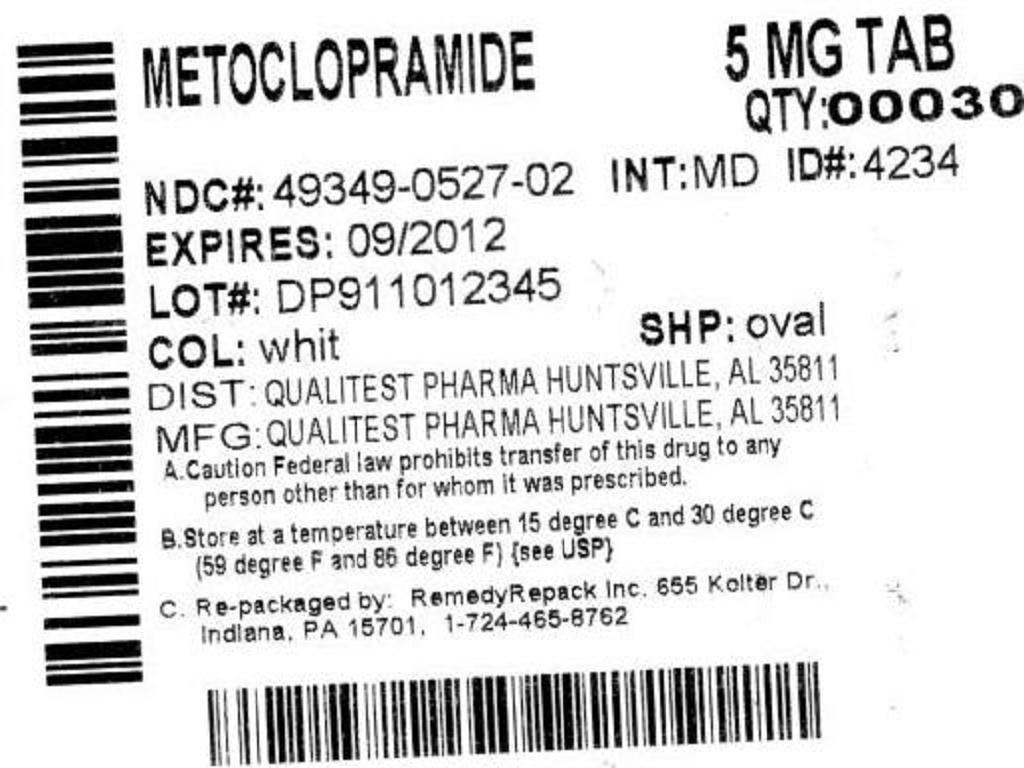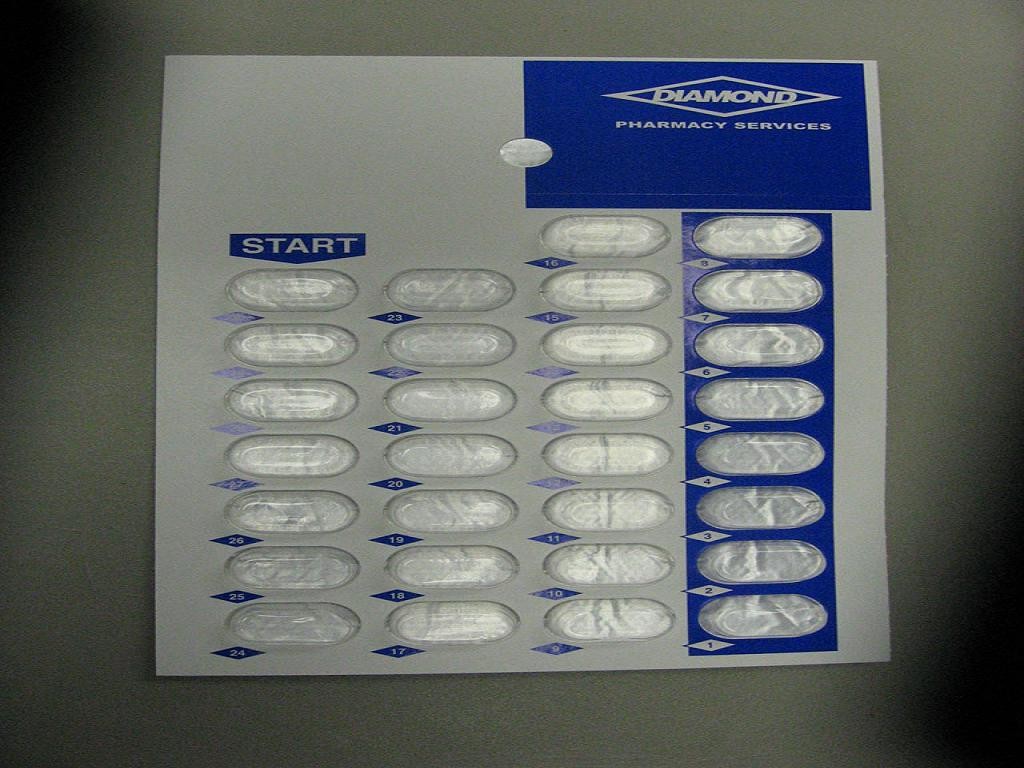Metoclopramide Hydrochloride
FULL PRESCRIBING INFORMATION: CONTENTS*
- BOXED WARNING
- METOCLOPRAMIDE HYDROCHLORIDE DESCRIPTION
- CLINICAL PHARMACOLOGY
- PHARMACOKINETICS
- INDICATIONS & USAGE
- METOCLOPRAMIDE HYDROCHLORIDE CONTRAINDICATIONS
- WARNINGS
- PRECAUTIONS
- INFORMATION FOR PATIENTS
- DRUG INTERACTIONS
- CARCINOGENESIS & MUTAGENESIS & IMPAIRMENT OF FERTILITY
- PREGNANCY
- NURSING MOTHERS
- PEDIATRIC USE
- GERIATRIC USE
- METOCLOPRAMIDE HYDROCHLORIDE ADVERSE REACTIONS
- OVERDOSAGE
- DOSAGE & ADMINISTRATION
- HOW SUPPLIED
- STORAGE AND HANDLING
- SPL MEDGUIDE
- PACKAGE LABEL.PRINCIPAL DISPLAY PANEL SECTION
FULL PRESCRIBING INFORMATION
BOXED WARNING
WARNING: TARDIVE DYSKINESIATreatment with metoclopramide can cause tardive dyskinesia, a serious movement disorder that is often irreversible. The risk of developing tardive dyskinesia increases with duration of treatment and total cumulative dose.
Metoclopramide therapy should be discontinued in patients who develop signs or symptoms of tardive dyskinesia. There is no known treatment for tardive dyskinesia. In some patients, symptoms may lessen or resolve after metoclopramide treatment is stopped.
Treatment with metoclopramide for longer than 12 weeks should be avoided in all but rare cases where therapeutic benefit is thought to outweigh the risk of developing tardive dyskinesia.
SeeWARNINGS
METOCLOPRAMIDE HYDROCHLORIDE DESCRIPTION
Inactive Ingredients

CLINICAL PHARMACOLOGY
WARNINGS
PHARMACOKINETICS
INDICATIONS & USAGE
The use of metoclopramide tablets is recommended for adults only. Therapy should not exceed 12 weeks in duration.Symptomatic Gastroesophageal Reflux
Diabetic Gastroparesis (Diabetic Gastric Stasis)
METOCLOPRAMIDE HYDROCHLORIDE CONTRAINDICATIONS
WARNINGS
Tardive Dyskinesia (see Boxed Warnings)
Neuroleptic Malignant Syndrome (NMS)
ADVERSE REACTIONS
PRECAUTIONS
GeneralINFORMATION FOR PATIENTS
DRUG INTERACTIONS
CARCINOGENESIS & MUTAGENESIS & IMPAIRMENT OF FERTILITY
PREGNANCY
Category BNURSING MOTHERS
PEDIATRIC USE
OVERDOSAGECLINICAL PHARMACOLOGYPharmacokineticsOVERDOSAGE
WARNINGSADVERSE REACTIONSExtrapyramidal Reactions
GERIATRIC USE
WARNINGSDOSAGE AND ADMINISTRATIONFor the Relief of Symptomatic Gastroesophageal Reflux
WARNINGSTardive Dyskinesia
CLINICAL PHARMACOLOGYPRECAUTIONSInformation for PatientsADVERSE REACTIONSCNS Effects
DOSAGE AND ADMINISTRATIONUSE IN PATIENTS WITH RENAL OR HEPATIC IMPAIRMENT
DOSAGE AND ADMINISTRATIONFor the Relief of Symptomatic Gastroesophageal RefluxUSE IN PATIENTS WITH RENAL OR HEPATIC IMPAIRMENT
Other Special Populations
OVERDOSAGE
METOCLOPRAMIDE HYDROCHLORIDE ADVERSE REACTIONS
CNS Effects
PRECAUTIONSWARNINGS
Extrapyramidal Reactions (EPS)
WARNINGS
WARNINGS
WARNINGS
Neuroleptic Malignant Syndrome
WARNINGS
Endocrine Disturbances
PRECAUTIONSCLINICAL PHARMACOLOGY
Cardiovascular
CONTRAINDICATIONSPRECAUTIONS
Gastrointestinal
Hepatic
Renal
Hematologic
OVERDOSAGE
Allergic Reactions
Miscellaneous
OVERDOSAGE
PRECAUTIONSOther Special Populations
DOSAGE & ADMINISTRATION
Therapy with metoclopramide tablets should not exceed 12 weeks in duration.For the Relief of Symptomatic Gastroesophageal Reflux
CLINICAL PHARMACOLOGYINDICATIONS AND USAGE
ADVERSE REACTIONS
For the Relief of Symptoms Associated with Diabetic Gastroparesis (Diabetic Gastric Stasis)
USE IN PATIENTS WITH RENAL OR HEPATIC IMPAIRMENT
OVERDOSAGE
HOW SUPPLIED
STORAGE AND HANDLING
SPL MEDGUIDE
What is the most important information I should know about metoclopramide tablets?
Abnormal muscle movements
-
● the longer you take metoclopramide tablets and the more metoclopramide tablets you take. You should not take metoclopramide tablets for more than 12 weeks.
-
● if you are older, especially if you are a woman
-
● if you have diabetes
-
● lip smacking, chewing, or puckering up your mouth
-
● frowning or scowling
-
● sticking out your tongue
-
● blinking and moving your eyes
-
● shaking of your arms and legs
What are metoclopramide tablets?
-
● in adults for 4 to 12 weeks to relieve heartburn symptoms with gastroesophageal reflux disease (GERD) when certain other treatments do not work. Metoclopramide tablets relieve daytime heartburn and heartburn after meals. It also helps ulcers in the esophagus to heal.
-
● to relieve symptoms of slow stomach emptying in people with diabetes. Metoclopramide tablets help treat symptoms such as nausea, vomiting, heartburn, feeling full long after a meal, and loss of appetite. Not all these symptoms get better at the same time.
Who should not take metoclopramide tablets?
-
● have stomach or intestine problems that could get worse with metoclopramide tablets, such as bleeding, blockage, or a tear in the stomach or bowel wall
-
● have an adrenal gland tumor called a pheochromocytoma
-
● are allergic to metoclopramide tablets or anything in it. See the end of this Medication Guide for a list of ingredients in metoclopramide tablets.
-
● take medicines that can cause uncontrolled movements, such as medicines for mental illness
-
● have seizures
Tell your doctor about all your medical conditions,
-
● depression
-
● Parkinson's disease
-
● high blood pressure
-
● kidney problems. Your doctor may start with a lower dose.
-
● liver problems or heart failure. Metoclopramide tablets may cause your body to hold fluids.
-
● diabetes. Your dose of insulin may need to be changed.
-
● breast cancer
-
● you are pregnant or plan to become pregnant. It is not known if metoclopramide tablets will harm your unborn baby.
-
● you are breast-feeding. Metoclopramide can pass into breast milk and may harm your baby. Talk with your doctor about the best way to feed your baby if you take metoclopramide tablets.
Especially tell your doctor if you take:
-
● another medicine that contains metoclopramide, such as metoclopramide orally disintegrating tablets, or metoclopramide oral solution
-
● a blood pressure medicine
-
● a medicine for depression, especially a Monoamine Oxidase Inhibitor (MAOI)
-
● insulin
-
● a medicine that can make you sleepy, such as anti-anxiety medicine, sleep medicines, and narcotics.
How should I take metoclopramide tablets?
-
● Metoclopramide comes as a tablet you take by mouth.
-
● Take metoclopramide tablets exactly as your doctor tells you. Do not change your dose unless your doctor tells you.
-
● You should not take metoclopramide tablets for more than 12 weeks.
-
● If you take too much metoclopramide tablets, call your doctor or Poison Control Center right away.
-
● Do not drink alcohol while taking metoclopramide tablets. Alcohol may make some side effects of metoclopramide tablets worse, such as feeling sleepy.
-
● Do not drive, work with machines, or do dangerous tasks until you know how metoclopramide tablets affects you. Metoclopramide tablets may cause sleepiness.
Metoclopramide tablets can cause serious side effects, including:
-
● Abnormal muscle movements. SeeWhat is the most important information I need to know about metoclopramide tablets?
-
● Uncontrolled spasms of your face and neck muscles, or muscles of your body, arms, and legs (dystonia).These muscle spasms can cause abnormal movements and body positions. These spasms usually start within the first 2 days of treatment. These spasms happen more often in children and adults under age 30.
-
● Depression, thoughts about suicide, and suicide.Some people who take metoclopramide tablets become depressed. You may have thoughts about hurting or killing yourself. Some people who take metoclopramide tablets have ended their own lives (suicide).
-
● Neuroleptic Malignant Syndrome (NMS).NMS is a very rare but very serious condition that can happen with metoclopramide tablets. NMS can cause death and must be treated in a hospital. Symptoms of NMS include: high fever, stiff muscles, problems thinking, very fast or uneven heartbeat, and increased sweating.
-
● Parkinsonism.Symptoms include slight shaking, body stiffness, trouble moving or keeping your balance. If you already have Parkinson's disease, your symptoms may become worse while you are receiving metoclopramide tablets.
-
● feel depressed or have thoughts about hurting or killing yourself
-
● have high fever, stiff muscles, problems thinking, very fast or uneven heartbeat, and increased sweating
-
● have muscle movements you cannot stop or control
-
● have muscle movements that are new or unusual
-
● feeling restless, sleepy, tired, dizzy, or exhausted
-
● headache
-
● confusion
-
● trouble sleeping
How should I store metoclopramide tablets?
-
● Keep metoclopramide tablets at room temperature between 68to 77(20to 25
-
● Keep metoclopramide tablets in the bottle it comes in. Keep the bottle closed tightly.
General information about metoclopramide tablets
What are the ingredients in metoclopramide tablets?
Active ingredient:
Inactive ingredients:
PACKAGE LABEL.PRINCIPAL DISPLAY PANEL SECTION


Metoclopramide HydrochlorideMetoclopramide Hydrochloride TABLET
| ||||||||||||||||||||||||||||||||||||||||||||||||||||||||||||||||||||||||||||
PLEASE, BE CAREFUL!
Be sure to consult your doctor before taking any medication!